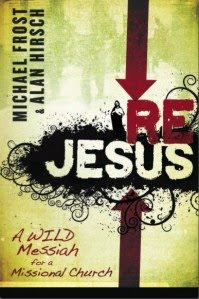
The second question that Alan and Michael, in their book
ReJesus, say the church to ask is:
How is the Christian religion, if we could legitimately call it that, informed and shaped by the Jesus that we meet in the Gospels?Michael and Alan argue that the Christian religion has been shaped too much by a Jesus that we have created rather than the Jesus the Gospels declare. They illustrate their point by directing our attention to popular portraits of Jesus.
They begin off with William Holman;s painting “The Light of the World” – which they call “the bearded-lady Jesus”. They describe it saying Jesus has “flowing blond locks swept back from the face, high cheekbones, groomed eyebrows, full lips, with heavenward gazing, gentle eyes – he’s beautiful.”… “He is wearing a silk ball gown (we’re not sure what else you’d call it).” And they sum up the shaping power of this image by stating “This is the inoffensive Messiah, clean and tidy, pleasing to the eye. This is no disturber of our souls. This image of Jesus reflects a spirituality that is anchored in an adoration of the wonderful Christ, the unattainable Jesus.”
Next painting is Pompeo Batoni “Sacred Heart” – this type of depiction of Jesus is called “the spooky Jesus”. This painting portrays Jesus “as an otherworldly being, swathed in swirling haloes and unearthly auras.” Jesus is divine but not really human. These kind of images focus solely on “the intangible, wise, ethereal, otherworldly, composed aspects of Jesus.”
On the flip side there is the image from BBC’s "Son of God" – they call this the “ordinary Galilean Jesus”. Michael and Alan use this image to emphasize the group that believe that Jesus is only human and not divine – “an ordinary itinerant storyteller and religious guru”.
The next images of Jesus examined are called the “revolutionary Jesus”. The authors point to Pier Paolo Pasolini’s film “II Vangelo secondo Matteo (The Gospel according to Saint Matthew)”. Here Jesus is seen someone who came to destroy and lead in a great revolution. Michael and Alan say that Jesus’ “work was to transform Israel, and beyond that the world, not by rejecting or abolishing Israel’s faith but by embodying it and calling Israel back to its true belief.”
So we have, the bearded lady Jesus, spooky Jesus, ordinary Galilean Jesus, and the revolutionary Jesus. They briefly mention a few more (and we can add some) like, German Jesus (a Jew with blue eyes?) or William Wallace Jesus. Alan and Michael say that these imagines of Jesus shape the Christian religion more than the Jesus in the Gospels.
Are they right?
I heard Michael speak the other day and he asked how well we knew the Jesus of the Gospels?
Have we moved beyond the Sunday School understandings of his stories and teachings (these are good for a 6 year old but aren’t we a little older and wiser)?
Do we know his teachings?
Do we quote him?
Is he our hero?
Do we strive to be like him?
Does the Jesus of the Gospels shape our church or just our safe distant images of him?














